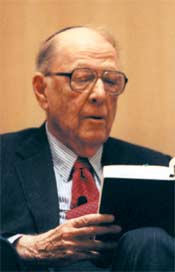 |
 |
 |
 |
|
ALUMNI PROFILE
He entered the College at 16 and graduated at 20 after serving
as a staff writer of the Spectator and editor of the Jester, a
portent of literary things to come. Herman Wouk ’34
went on to become one of this nation’s greatest storytellers,
and he recently returned to Morningside Heights to commemorate the
50th anniversary of the publication of his Pulitzer Prize-winning
novel, The Caine Mutiny. Wouk’s reading on February 7 at the Kraft Family Center
for Jewish Student Life had been postponed from last fall following
the events of September 11. The event was held in conjunction with
the Rare Books and Manuscript Library, where many of Wouk’s
papers are housed. Wouk briefly addressed the audience of several hundred,
reflecting on what he described as the unexpected success of his
novels, which include Winds of War and War and Remembrance.
He also reflected on his days at the College, which awarded him the
Alexander Hamilton Medal for distinguished service and
accomplishment in 1980. “Columbia is, in effect, a
philosopher’s holiday,” Wouk said at the time,
referring to the title of a book by one of his favorite professors,
Irwin Edman ’16. “Philosopher, because you came to
grips with ideas and values that matter most. Holiday, because it
is exciting and alive and great fun. It’s a glorious school.
I owe what skill I have in the wielding of the English language to
what I learned at Columbia.” The son of Russian Jewish parents who emigrated from Minsk, Wouk
grew up in the Bronx, attended public schools and enrolled at
Columbia at a time “when great numbers of Americans, young
and old, came to believe that the capitalist system had betrayed
the citizenry, and that the whole structure was obsolete and
doomed. We had a spell of upheaval and agitation at Morningside; it
took place in the spring, as those things do. Thirty-five years had
to pass before an equally radical crisis in American life, the
Vietnam War, would evoke in Columbia College a comparable
springtime storm. “Trustees are embarrassed at such tempestuous moments, and
alumni fret. As my hair has gone from thin and black to thin and
gray, I have evolved from a vocal demonstrator to an anxious
fretter. But now, as then, I am secretly proud of what these rough
moments indicate. My school dwells at the leading edge of social
events and of progressive thought. Its situation in New York, the
world’s greatest city, so wealthy, dazzling and racked by
change, guarantees this. In the long, quiet years, as well as in
the brief troubled outbursts, Columbia is — to use the vivid
jargon of the moment — where it’s at.” In introducing Wouk, who will be 87 on May 27, Dean Austin
Quigley called him a writer who “has displayed a variety of
talents — an indispensable gift as a storyteller, a capacity
to create vivid and original characters, a remarkable ability to
depict in evocative detail social and historical situations, a
highly developed sense of humor and irony, and in the midst of it
all, a strong sense of moral imperative, of the importance of
understanding how human beings make choices, how people invoke,
abandon and defend values. This is not the moral imperative of an
ideologue who thinks he knows what is best for everyone in all
circumstances, but the moral imperative of someone who recognizes
with sympathy and humor the force of the old phrase that if we do
not all hang together, we will surely hang
separately.” Quigley concluded his introduction by describing Wouk as “a true son of Columbia, a man of great religious faith, great artistic talent, and great human achievement.”
|
|
||||||||||||||||||||||||||||||||||||||||||||||||
